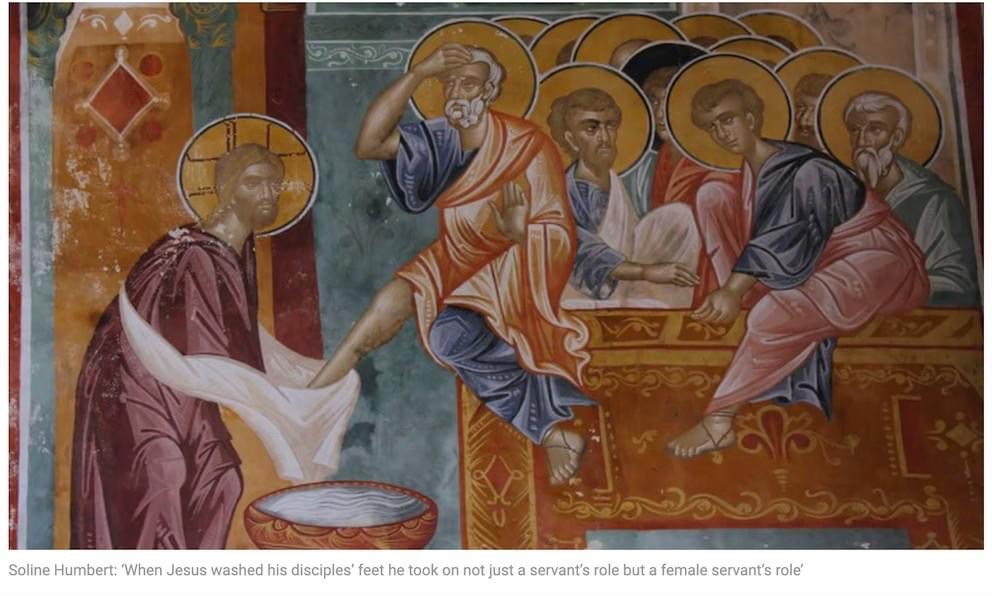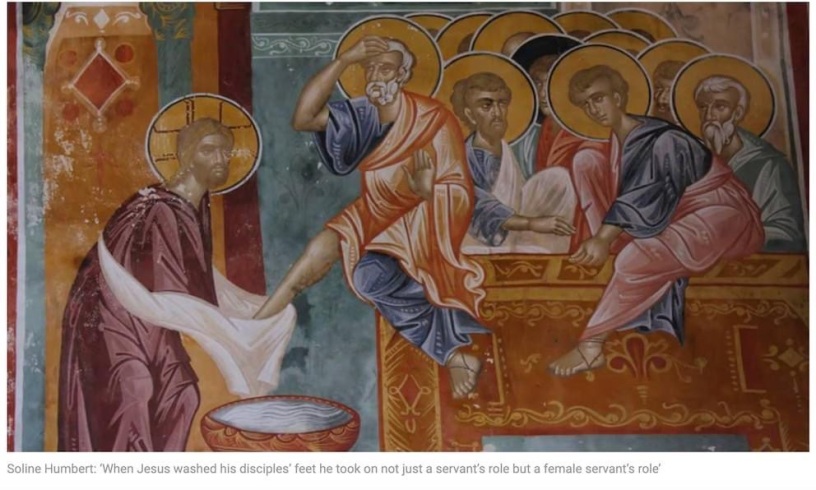
Rite & Reason: If Jesus can wash his followers feet women can lead the church
He subverted the master/servant power relationship and the male/female relationship
Soline Humbert; The Irish Times; 22 March 2016
On Holy Thursday in Catholic churches throughout the world the ritual of the washing of the feet will be enacted, in memory of Jesus’s example of loving intimate service and in fulfilment of His command to his disciples to do the same.
This year a change in the rules at the request of Pope Francis means that women may officially be among those whose feet can be washed. The priests, however, will remain males.
When Jesus washed his disciples’ feet he took on not just a servant’s role but a female servant’s role, for it was mostly women and girls who performed this task: servants for their masters and important guests, wives for their husbands.
Significantly, the only other person in the Gospels who washes feet is a woman, who washes Jesus’s own feet (Luke 7), and in Paul’s letter to Timothy (5:10) it is specified that “the widows must wash the feet of the saints”.
When Jesus washed His followers’ feet He subverted not just the master/servant power relationship but also the male/female relationship. Jesus made Himself a servant girl, a female slave, a wife. He transgressed the strict rules delineating gender roles.
When He removed his outer vestment, Jesus stripped Himself of His male privileges of power and superiority. He wrapped a towel around His waist, as females did. No wonder Peter first objected so vehemently!
It is therefore deeply ironic that the official liturgy remains so wedded to a strict sexist, patriarchal division of gender roles as does the theology and organisation of the institutional church. Because of their gender women remain excluded from governance, decision making and all the ordained ministries.
Access
This year marks the 20th anniversary of Women’s Ordination Worldwide (Wow). This international movement was founded in Gmunden (Austria) in July 1996 at the first European women’s ecumenical synod “Women For Change in the 21st century”. Wow works for women’s access to all the ordained ministries, with a focus on the Roman
Catholic Church
Two years after Pope John Paul II’s authoritarian attempt at silencing debate by papal edict in 1994 there was a sense that this had to be resisted as a matter of conscience.
Wow’s first international conference was held in Dublin in 2001, hosted by Brothers and Sisters in Christ – Basic (now part of We Are Church Ireland).
Several of the speakers were threatened with excommunication and/or dismissal from their religious orders. The speaker from the World Council of Churches was forced to withdraw. Opening the conference, Nobel peace prize winner from Belfast, Mairéad Corrigan Maguire, said: “I believe this kind of attempt to control by the Vatican is an abuse of power. It is dehumanising, demoralising, and is a form of spiritual abuse.”
Discipleship
Two more conferences were held: at Ottawa in 2005 and Philadelphia last year. There is a consensus that it is not a question of ordaining women (married and single) into the present clericalised, patriarchal power structure, but of a broader and deeper transformation into a discipleship of equals.
Wow encompasses a variety of approaches to the present blockage, including some which go beyond the present oppressive rules. On one hand hundreds of women have been ordained in what has been called “prophetic ordinations”, and on the other hand an increasing number of intentional Eucharistic communities, in Ireland and elsewhere, celebrate without an officially ordained minister.
As Sr Anne E Patrick SNJM wrote in Conscience and Calling: Ethical Reflections on Catholic Women’s Church Vocations: “it is fitting for Women Transforming Church to give thanks, indeed to preside at Eucharist, and to do this in the name and memory of Jesus, whose ethical ideals, as His followers insisted from the beginning, included the belief that, if it came to a choice, one should obey God and not human beings (Acts 5:27-29).”
This Holy Thursday in some Catholic communities there will be mutual washing of feet, with all being served and serving, men, women, lay, ordained. When Jesus washed Peter’s feet He told him: “You do not understand now what I am doing, but later you will understand (John 13:7).”
If we understand now that Jesus calls us to forsake patriarchal structures of domination, we will let go of all that excludes women from symbolising the Christ who became one with them in loving service.
Soline Humbert is a spiritual director and was spokeswoman for Wow2001 Dublin

